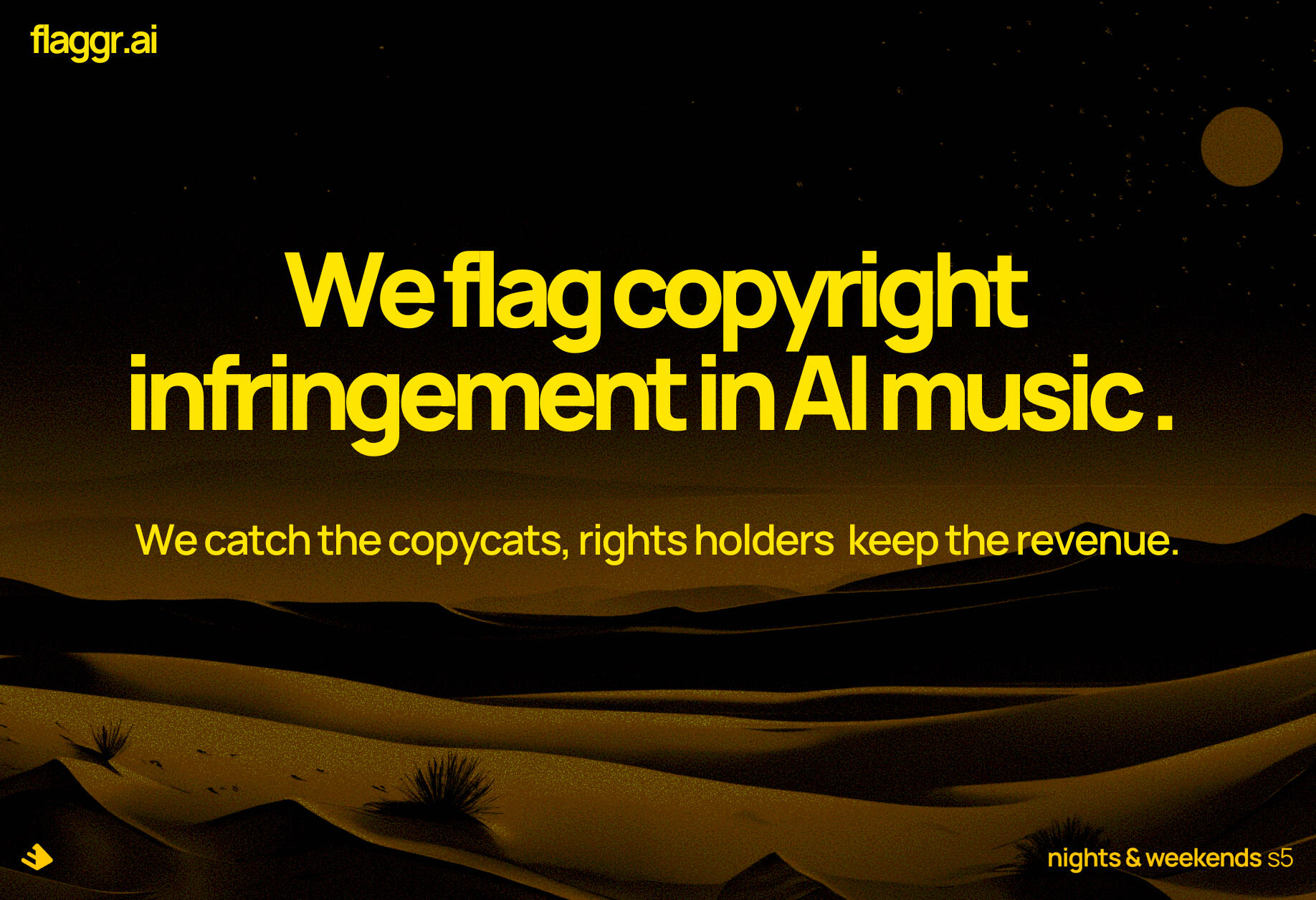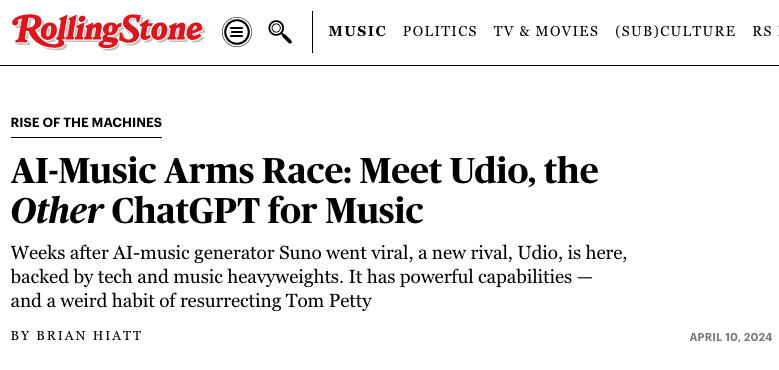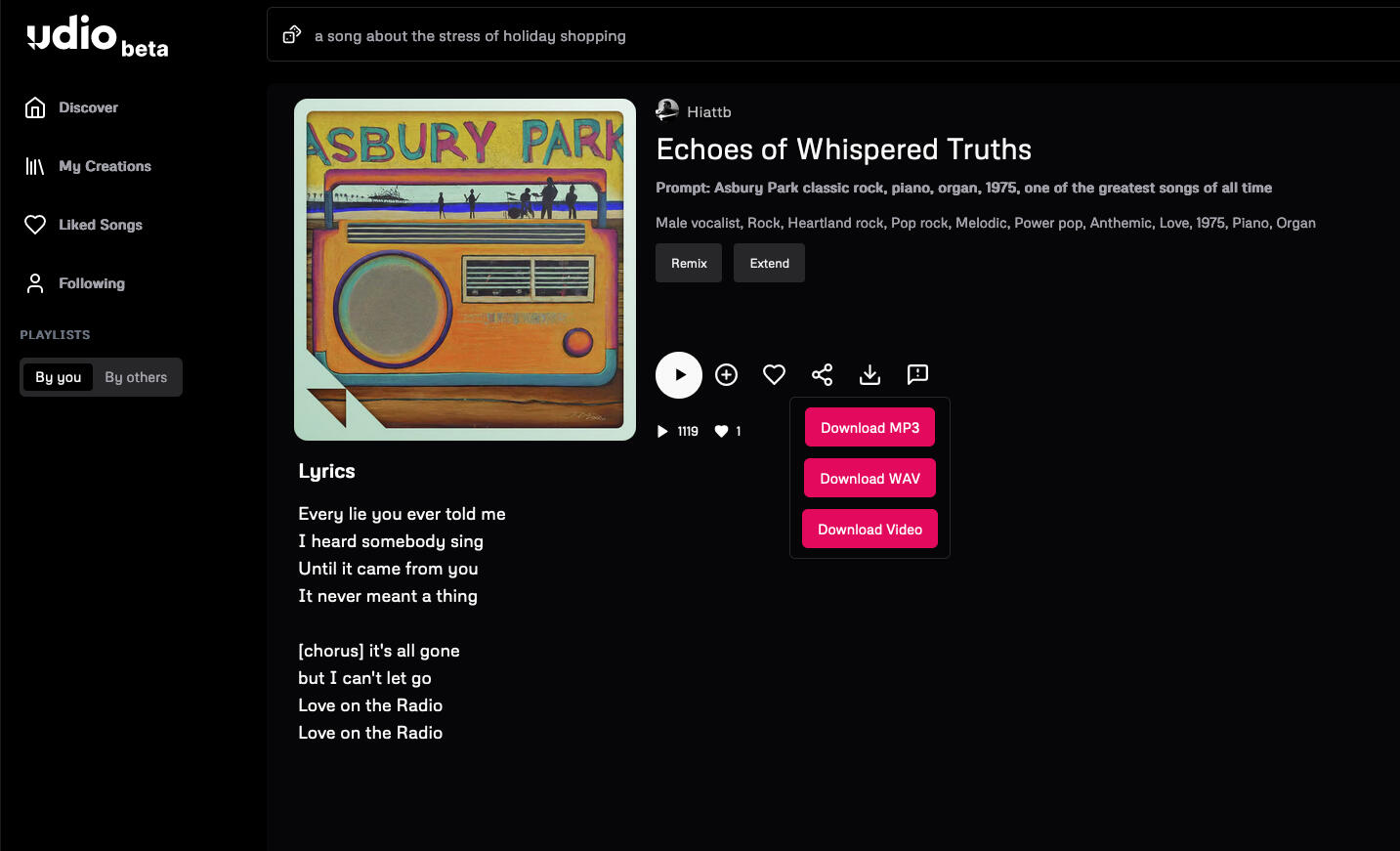FLAGGR.AI
WE CATCH THE COPYCATS,
RIGHT HOLDERS KEEP THE REVENUE.
They call it "Generative" AI,
We call it "Copying".
AI music often incorporates elements from existing works, blurring the line between inspiration and infringement.
Tracking, Tracing and Flagging AI Generated Music Copyright Infringement
FLAGGR.AI utilizes machine learning algorithms, neural networks, and expert musicologist techniques to detect AI-generated works that infringe on copyrighted material.
AI trains on massive datasets of music and this instruction leads to flagrant imitation and copyright infringement of musical works and sound recordings, furthering lack of accountability and artists and right holders losing revenue and recognition.
We are here to make sure AI creates alongside artists - not instead of them.
1 AUDIO INPUT.
2 FLAGGR.AI ANALYSIS ENGINE.
3 MUSICOLOGIST REVIEW.
4 ACTION.
Exciting news! Our exclusive BETA release is launching at the end of 2024. Be among the first 100 users to experience our cutting-edge product. Enter your email to secure your spot and join our select group of early adopters.
Countdown to Launch 2024!
We are participating in @buildspace nights & weekends, season 5 accelerator.
Take a play-by-play, week-over-week peek at what we are building.
2024 © ADV3NT, Inc. d.b.a. FLAGGR.AI
@buildspace + @nightsweekends s5
accelerator feed
week 1 update
Flaggr.AI works by allowing rights holders to submit music or simply point us towards potentially infringing work. Flaggr.AI then utilizes a combination of machine learning algorithms, neural network analysis, and expert musicological techniques to identify AI-generated music that infringes on copyrighted material. This expertise ensures nuanced decision-making in the detection process.

week 2 update
Major record labels Sony Music Entertainment, Universal Music Group Recordings, and Warner Records are suing AI music makers Udio and Suno. They claim these companies use copyrighted music to train their AI without permission, resulting in songs that directly copy existing music, not just imitate it.While this lawsuit is a positive step, it highlights the ongoing challenge of identifying and addressing AI-generated music that infringes on copyrights. This is where Flaggr.AI comes in.6.14.2024
Our software excels at isolating AI-generated vocals in recordings, enabling rights holders to flag copyright infringement.
Below are several examples:
The Cure v. Vinyl Nightmares
[ Original ]
The Cure - The Walk
Isolated Vocals
[ Possible Copyright Infringement ]
Vinyl Nightmares - The Psychedelic Pearls Ft Peter Spook The T*ts
Isolated Vocals
Vinyl Nightmares, a YouTube channel with 30.8K subscribers, features 37 videos showcasing AI-generated songs. One example, "The Tts"* by "The Psychedelic Pearls Ft Peter Spook," bears a strong sonic resemblance to the work of The Cure particularly the vocals reminiscent of lead singer Robert Smith.While the composition itself (melody and lyrics) may not be directly infringing, the AI-generated song's similarity to The Cure's sound recordings raises potential copyright concerns. This could be copyright infringement under the Sound Recording Copyright Law, depending on the degree of similarity and the purpose of the use.The ELVIS Act, applicable in Tennessee, might also be relevant if the AI convincingly replicates Robert Smith's vocal style, potentially constituting unauthorized use of his voice.For educational and illustrative purposes only, we've included a short snippet of an isolated vocal recording from The Cure's "The Walk" for comparison. We do not claim ownership of this snippet.
Tom Petty v. Udio
[ Original ]
Tom Petty & The Heartbreakers - "Breakdown"
Isolated Vocals
[ Possible Copyright Infringement ]
Udio - "Echoes of Whispered Truths"
Isolated Vocals

According to a Rolling Stone article by Brian Hiatt, AI music generator Udio has created a song titled "Echoes of Whispered Truths" that bears a striking resemblance to the vocal stylings of the late Tom Petty.

While the melody and lyrics of "Echoes of Whispered Truths" are likely original creations, the AI-generated song's vocal similarity to Tom Petty and the Heartbreakers' recordings raises potential copyright concerns under the Sound Recording Copyright Law.The ELVIS Act, applicable in Tennessee, could also be relevant if the AI convincingly replicates Tom Petty's vocal characteristics. This act protects performers from unauthorized use of their voice.For educational and illustrative purposes only, we've included a short snippet of an isolated vocal recording from Tom Petty And The Heartbreakers' "Breakdown" for comparison. We do not claim ownership of this snippet.
Bob Dylan v. Obscurist Vinyl
[ Original ]
Bob Dylan - "Blowin' in the Wind"
Isolated Vocals
[ Possible Copyright Infringement ]
Obscurist Vinyl- Rob Villain - "Pi**in in the Wind"
Isolated Vocals
Obscurest Vinyl, a YouTube channel with 152K subscribers and a Spotify "Artist" account with 214K monthly listeners, features 29 videos showcasing AI-generated music. One example, "Pi**in In The Wind" by "Rob Villain" (which is no longer available), bore a strong sonic resemblance to the work of Bob Dylan, particularly his vocals and his song, "Blowin' in the Wind.”The removed AI-generated song's resemblance to Bob Dylan's "Blowin' in the Wind" raises potential copyright questions. The degree of similarity across composition (melody, lyrics) and sound recording elements would be key factors in determining copyright infringement under the Sound Recording Copyright Law for the vocals and potentially the Performance Copyright Law for the melody and lyrics.The ELVIS Act, applicable in Tennessee, might also have been relevant if the AI convincingly replicated Bob Dylan's vocal characteristics. This act protects performers from the unauthorized use of their voice.For educational and illustrative purposes only, we've included a short snippet of an isolated vocal recording from Bob Dylan's "Blowin' in the Wind" for comparison. We do not claim ownership of this snippet.
The Beatles v. Udio
[ Original ]
The Beatles - "Drive My Car"
Isolated Vocals
[ Possible Copyright Infringement ]
Udio Version
Isolated Vocals. Already Taken Down.
[ Original ]
The Beatles - "Martha My Dear"
Isolated Vocals
[ Possible Copyright Infringement ]
Udio Version
Isolated Vocals. Already Taken Down.
[ Original ]
The Beatles - "Everybody's Got Something To Hide (Except Me And My Monkey)"
Isolated Vocals
[ Possible Copyright Infringement ]
Udio Version
Isolated Vocals. Already Taken Down.
YouTube channel Sync My Music identified three instances where Udio's AI-generated songs bore a strong resemblance to The Beatles' sound recordings. These songs, since removed, exhibited clear similarities to "Everybody's Got Something To Hide (Except Me And My Monkey)", "Drive My Car", and particularly the vocal style of Sir Paul McCartney.This resemblance raises potential copyright concerns. The degree of similarity across both the musical composition (melody, lyrics) and the sound recording elements (particularly the vocals) would be key factors in determining infringement under the Sound Recording Copyright Law for the vocals and potentially the Performance Copyright Law for the melody and lyrics.The ELVIS Act, applicable in Tennessee, might also have been relevant if the AI convincingly replicated The Beatles’ or Sir Paul McCartney’s vocal characteristics. This act protects performers from the unauthorized use of their voice.For educational and illustrative purposes only, we've included short snippets of isolated vocal recordings from The Beatles’ "Everybody's Got Something To Hide (Except Me And My Monkey)", “Martha My Dear” and "Drive My Car" for comparison. We do not claim ownership of these snippets.